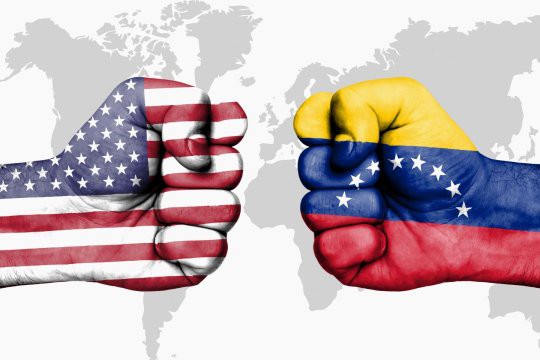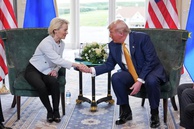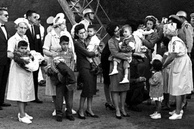On September 9, the United States sent a ninth warship towards Venezuela under the pretext of combating drug cartels. According to some US officials close to the Donald Trump administration, the operation against Venezuela will become a "Second Operation Noriega." As a reminder, on December 24, 1989, during a US military operation, Panamanian national liberation leader Manuel Noriega was overthrown, "accused" by Washington of involvement in the very same drug trafficking. This means that the situation with Venezuela is not the first case of “American democracy” being “promoted” in Latin American and Caribbean countries.
Washington's plans now are just as clear as they were 36 years ago, and it seems that no one is making any secret of them too. Defense Secretary Pete Hegseth, now dubbed the "Secretary of War" by Trump, frankly told Fox News that President Trump was possibly mulling a regime change in Venezuela. [1]
Meanwhile, President Trump has increased the bounty on Venezuelan President Nicolas Maduro's head to $50 million, up from $25 million, for information leading to his arrest. The pretext is banal: Maduro allegedly harms the interests of the American people and, therefore, is an outlaw. However, on September 5, Trump said that he has no intention of using force to change the government in Venezuela, which sounds extremely contradictory given all the military preparations and the ever changing nature of the US president's decisions and statements.
Therefore, such threats from the US should be taken seriously. Suffice it to mention the US Navy’s September 2 attack on a Venezuelan boat in the southern Caribbean Sea, which, according to the American side, was transporting drugs. Eleven Venezuelan citizens aboard the vessel were killed in the attack. Following the incident, US Secretary of State Marco Rubio merely clarified, quite casually and without presenting any evidence that eliminated in that “lethal strike” were members of the "Tren de Aragua" drug cartel. [2] The Pentagon limited itself to a brief confirmation of the "precision strike," and President Trump published a video, allegedly taken from a drone, showing an explosion on a boat at sea.
According to The Washington Post, the incident was essentially the first confirmed use of "American military might against Maduro" after the US Navy command deployed a significant naval group in the region at the end of August, with eight US ships participating in an expanded "anti-narcotics operation.
The sheer size of these forces looks like preparation for a large-scale military operation. According to the newspaper, the US has sent three destroyers to the Venezuelan coast, including the USS Gravely, USS Jason Dunham, and USS Sampson, with 1200 Aegis-class missiles, as well as a submarine, the Iwo Jima cruiser with 2,500 Marines on board, two dock landing ships, a universal landing ship, and the USS Minneapolis-St. Paul coastal zone ship. They carry Coast Guard and law enforcement personnel who plan to arrest suspects during drug seizures. AH-1Z Cobra helicopters and AV-8B Harrier attack aircraft will provide support to the marine landing forces. P-8 reconnaissance aircraft constantly circle over the Caribbean. The USS Lake Erie cruiser is also in close proximity to the Venezuelan coast, indicating the seriousness of US intentions towards the authorities of Bolivarian Republic, possibly including an attempt to physically eliminate Maduro and change the country’s government.
Small wonder that Washington’s actions were seen in Caracas as a direct threat to the country’s sovereignty. During a news conference, Venezuelan President Nicolas Maduro promised that "Trump's hands will be stained with blood" as his actions are drawing the United States into a war in the Caribbean. The Venezuelan president is convinced that Washington is using the fight against drug cartels just as a pretext, while in reality its goal is to overthrow the government of the Republic.
"Washington's actions are the most serious threat on the Latin American continent in the last 100 years and Venezuela is ready to give a military response to US aggression," Maduro noted. According to reports coming from Caracas, the Venezuelan president announced a general mobilization and put the troops on high alert, also calling on the citizens to "join the armed forces to defend the country." Considering Washington’s belligerent attitude towards the Venezuelan leadership, many experts assess the whole situation as "a calm before a storm" and extremely tense. Washington's official position regarding Caracas is crystal clear and is expressed by a simple formula: "Maduro must leave himself or be helped to do so, since Trump is not satisfied with him."
Western analysts generally agree that the US military buildup in the Caribbean significantly exceeds the usual scale of deployment in the region, especially since it is not clear how missile cruisers and a nuclear submarine can "hinder drug trafficking." Adding fuel to the fire, "anonymous sources in the White House" claim that "Maduro's clock is about to strike midnight, and this is not a Cinderella story." However, not everyone in the US supports Washington's current aggressive approach to Caracas, with a number of experts familiar with the situation arguing that, firstly, destroying a vessel instead of intercepting it and detaining the crew is an extremely unusual tactic for anti-drug operations in the region. Secondly, as Adam Isaacson, Director of Defense Oversight at the Washington Office on Latin America (WOLA), noted, "suspected drug trafficking is not grounds for a death sentence for Maduro." Thirdly, it cannot be ruled out that the military operation off the coast of Venezuela also pursues the interests of America’s Big Business, and the decision by the White House to extend Chevron’s license to continue oil production in Venezuela only confirms this. Indeed, last week two tankers with Venezuelan oil arrived in the US.
Besides, it looks like Maduro has been a “thorn” in Trump’s side ever since his first term in the White House. Late in March 2020, Trump announced a special operation in Venezuela, with a private security firm, Silvercorp USA, to infiltrate Venezuela by sea and capture the Venezuelan president and other high-level figures in his administration on Macuto Beach. That operation failed, bur the frustration remains.
However, clearly underlying the current situation with Venezuela is Washington’s strategy of dominance in the countries of Central and South America, a region that it considers its “backyard." This concept found its reflection almost two centuries ago in the Monroe Doctrine. Back in those days, the United States was approximately four times smaller in territory than it is today, and its demands were four times less ambitious in 1823, when this doctrine was announced by America’s then president James Monroe.
Just as the United States solidified its position as the West’s leading global power following World War II, its appetite for control over its "backyard" significantly increased. For the past two centuries, the US has repeatedly interfered in the affairs of, and often invaded Latin American countries, and keeps doing this today.
"If you want to know the future, look to the past," says a Chinese proverb. As early as 2019, under President Donald Trump, then-Vice President Mike Pence confirmed this adage's relevance, reminding Fox News that Washington bears a "special responsibility for promoting democracy and freedom in this hemisphere," saying that "a failing state has no borders” and pointing to Venezuela and other Latin American countries as examples.
Since the mid-20th century, Washington has regularly and brutally dealt with undesirable leaders in Latin American countries. Brazil and Bolivia, Guatemala and Haiti, Mexico and Cuba, Guatemala and Nicaragua, Haiti and the Dominican Republic have all been victims of American "state control" on more than one occasion. And now Venezuela, where Donald Trump appointed Juan Guaido as "interim" president instead of the incumbent, Nicolas Maduro, who was unacceptable to Washington.
Analyzing the relationship between Caracas and Washington, it dramatically shifted in 1999, when Hugo Chavez was elected president and declared himself "anti-imperialist." Chavez started by strengthening his country’s sovereignty, primarily when it comes to its oil wealth, which the US had ruthlessly exploited for a century. Chavez reversed the privatization of the state-owned oil company PDVSA and ramped up taxes on foreign oil companies. Oil revenues funded social programs, including healthcare and education, employment, housing, culture and pensions, as well as Venezuelans' free access to safe drinking water.
Elected president of the Bolivarian Republic of Venezuela on April 19, 2013, Nicolas Maduro continued Hugo Chavez's policies. During the 2019 presidential crisis, he announced that Venezuela was breaking off relations with the United States after President Donald Trump declared that the US recognized Juan Guaido as "president of the National Assembly and interim president of the country." And here comes Washington’s response.
Summary:
First, under the guise of "fighting drug cartels," Washington is preparing a military invasion of the country and the removal of the popularly elected government.
Second, Washington's actions are a gross violation of international law.
Third, in this context, the interview given to TASS by Brazilian MP Reymont Ottoni deserves attention. He believes that BRICS countries, including Russia, should respond to the US threats against Venezuela.
As for Russia's position regarding the current situation, Foreign Minister Sergei Lavrov emphasized Moscow’s strong support for the Venezuelan authorities’ efforts to protect their country’s national sovereignty. In a telephone linkup with Venezuelan Vice President Delcy Rodriguez Gomez, Sergei Lavrov expressed solidarity with the republic's leadership in the face of increasing external pressure on Caracas.
The views of the author are his own and may differ from the position of the Editorial Board.
[1] The Pentagon chief mentioned a possible regime change in Venezuela. September 3, 2025. https://ria.ru/20250903/venesuela-2039407364.html
[2] The State Department: The United States and Mexico will cooperate in eliminating drug cartels. September 3, 2025. https://tass.ru/mezhdunarodnaya-panorama/24952795
[3] Lavrov expressed support for the Venezuelan authorities in an August 22,2025 telephone conversation. https://ria.ru/20250822/lavrov-2037056542.html
read more in our Telegram-channel https://t.me/The_International_Affairs

 9:39 16.09.2025 •
9:39 16.09.2025 •



























